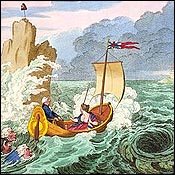 A colleague brought back an interesting tidbit from the BIS Update Conference last week relating to one of the unresolved conundrums of the current export reform efforts. Under the currently proposed reforms, certain items on the United States Munitions List will be transferred to the Commodity Control List, which will transfer licensing jurisdiction over those items from the Department of State’s Directorate of Defense Trade Controls (“DDTC”) to the Department of Commerce’s Bureau of Industry and Security (“BIS”). That process is summarized in some detail in this BIS fact sheet.
A colleague brought back an interesting tidbit from the BIS Update Conference last week relating to one of the unresolved conundrums of the current export reform efforts. Under the currently proposed reforms, certain items on the United States Munitions List will be transferred to the Commodity Control List, which will transfer licensing jurisdiction over those items from the Department of State’s Directorate of Defense Trade Controls (“DDTC”) to the Department of Commerce’s Bureau of Industry and Security (“BIS”). That process is summarized in some detail in this BIS fact sheet.
In a presentation at Update by Kevin Kurland, in BIS’s Office of Enforcement Analysis, there was confirmation that even after the transfer of items to the CCL, previously issued DDTC licenses will remain effective for two years.
Now here’s the issue: suppose you are exporting a 600 series item under a grandfathered DDTC license and some irregularity occurs in the export. If the exporter decides to report this issue, to whom is the report made. Is it in a voluntary disclosure to DDTC or a voluntary self disclosure to BIS? (One thing that we can hope about export reform, but which appears to be a futile hope, is that we could forever stamp out this silly terminological distinction. Please, guys, agree to include or omit “self’ and move on!)
It seems that there is no current resolution to this issue. So what does the exporter do? File a disclosure with each agency? Or avoid the issue by not shipping under grandfathered DDTC licenses and getting new license from BIS? Of course, most exporters would prefer to file a disclosure with DDTC which does not appear to consider the disclosure process as a revenue collecting enterprise and is often thought to be fairer in dealing with parties that make a voluntary disclosure. But that option may not be available.
 Permalink
Permalink
Copyright © 2012 Clif Burns. All Rights Reserved.
(No republication, syndication or use permitted without my consent.)

 Posted by
Posted by  Category:
Category: 

